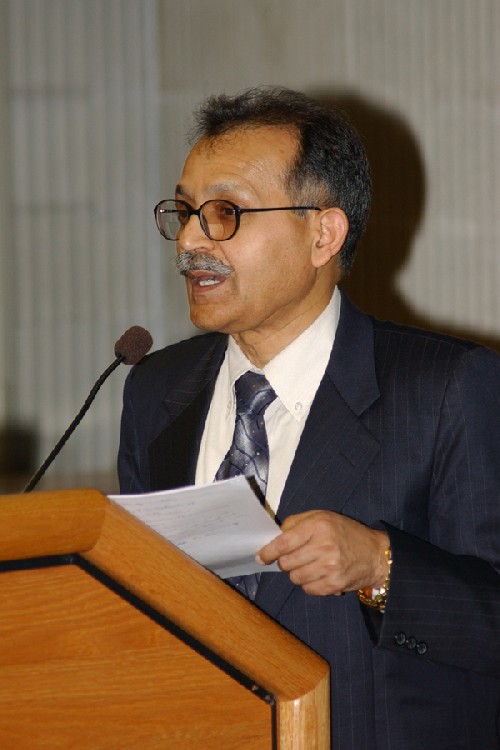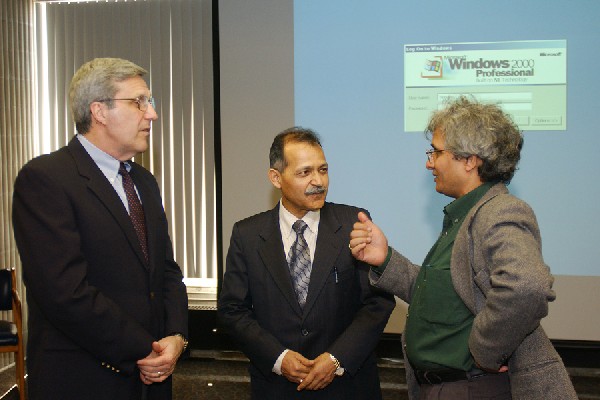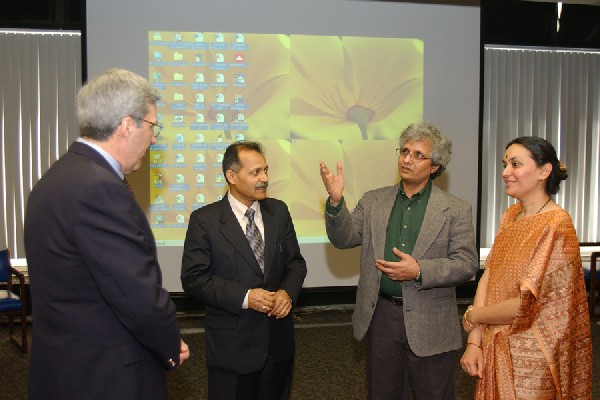Contribute
| India Foreign Ministry Secretary C. M. Bhandari Addresses UMD Indic Studies Seminar |
Balram Singh
03/25/2004
The University of Massachusetts Dartmouth’s Center for Indic Studies hosted a special seminar conducted by Mr. C. M. Bhandari, the Joint Secretary for the Ministry of External Affairs in the federal government of India. The seminar was held on March 1 in the Library Browsing Area from 11 a.m. to 12 p.m. Secretary Bhandari addressed the politics and realities associated with business outsourcing by companies in the United States and other nations.
In his opening remarks, Mr. Bhandari outlined India’s outlandish growth in many sectors, including automobiles (36.5% increase, with $2 billion in exports), Pharmaceuticals (20% growth rate, with $2.5 billion in exports), healthcare (1.3 million medical travelers to India last year, $1 billion), biotechnology, etc.He pointed out India’s strength in education, business culture, and current wave of economic liberalization as major reasons for these growths.
He said that in India thousands of businesses have closed because they were rendered uncompetitive after the opening of the Indian economy in 1991. For example, India’s traditional textile sector employed hundreds of thousands of people but today, state of the art textile mills with gigantic technological capacity have replaced the older, less productive mills thus eliminating thousands of jobs. As the world increasingly moves toward globalization in a free and fair market economy, business outsourcing is more popular than ever and India has become a prime location for that activity.
He narrated a story from his own experience as Indian Consul General in Toronto to emphasize the point that economic globalization is not just one-way traffic.
“I am reminded of a Paper Pulp mill in New Brunswick province of Canada of 1920s vintage that had become uneconomic by early 1970s. The government invested several million dollars in technology up-gradation but could not revive it. It was closed in early 1990s. The 300 workers were laid, dependent on social security. The Birlas from India looked at it and decided to convert it into a rayon pulp mill. They needed the pulp for their factories in India, Indonesia, and Thailand. The plant is now running full capacity and the entire work force has been reemployed. A mill that had become obsolete for paper pulp for the north American market, could be made competitive for a different product for the Asian market.”
Mr. Bhandari said, “we have to create win-win situations for all stake holders - governments, producers, financiers, employees, and above all, the consumers.” He said the moral of the story is do not play politics with principles of economy. “We in India suffered for over two decades because of over protection.”
“The high tariff rates protected Indian industry from outside competition but rendered it outdated, inefficient and complacent. The consumers had to pay a much higher price for a relatively sub-standard product.” “For decades, Indian public had to wait for years to buy a sub-standard car and pay a high price for the inefficiency of the industry. Today, the consumer can get anything of the shelf and at very attractive prices.”
Mr. Bhandari said that business outsourcing is something like getting components. Today, all the major auto manufacturers of the world, including the Ford, General Motors, Mercedies and others, outsource auto components from India. Why should anyone treat the BPO any differently? If they do, they would only be rendering their businesses uncompetitive.
“The BPO revolution has spread in India because it is not capital intensive. It is knowledge intensive of which there is no dearth in India,” said Mr. Bhandari. “In the past, India did not catch up with the rest of the world in industrialization because it lacked capital and initially even the technology to be competitive,” he added.
Mr. Bhandari was introduced by Dr. Louis Esposito, and economics and Vice Chancellor for Academic Affairs at UMass Dartmouth. Dr. Esposito said, “there is major interest in this country to learn about India. The 2 million Indian-Americans, and their business connections to India, play a significant role in American society.”
Mr. Bhardari was on his way back from South America where he represented India to the G-15 Economic Summit. He has been a brilliant scholar of science and philosophy throughout his career. He joined the Indian diplomatic service in 1974, serving in Bangkok, Oslo, Lagos, and Canberra. He also served as India’s Ambassador to Cambodia, and as Consul General in Toronto.
Throughout his career in the Indian public service, Mr. Bhandari has held several important assignments at the Ministry of External Affairs. Currently he supervises India’s foreign policy relations in multilateral organizations like the United Nations and the World Trade Organization.
Mr. Bhandari is author of three books, Saving Angkor, 1996, A Journey to Heaven, 1998, and Yoga Shakti, 2002. His lecture will focus on whether businesses can survive without outsourcing certain business processes to developing countries.
At the end of the seminar, Dr. Esposito said, “this was very informative seminar. I learned a lot about Indian economy and business environment.”
“In the 56 years since its independence, India has developed abundant technology and also sufficient capital resources. It has therefore been possible for India to exercise required changes in its economy in a bid to become internationally more competitive,” said Dr. Singh.
“Given the strategic alliance being forged between India and the United States based on their common interest and value of democracy, it is important for the two nations to join hands in creating opportunities for their people” Dr. Singh added.
You may also access this article through our web-site http://www.lokvani.com/

Foreign Ministry Secretary C.M.Bhandari

Vice Chancellor Esposito, C. M. Bhandari, Dr. Balram Singh

Vice Chancellor Esposito, C. M. Bhandari, Dr. Balram Singh, Dr. Vanita Shastry